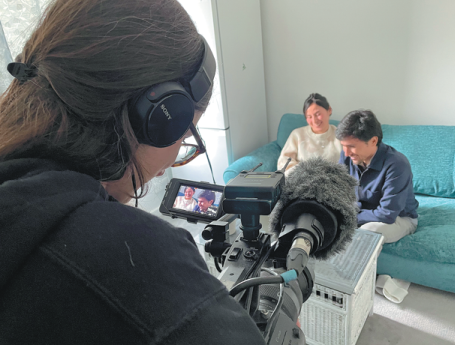Nonprofits find ways to help new arrivals in Britain
When asked about the purpose of government, Confucius said, "Make the local people happy and attract migrants from afar." But looking at Britain's immigration policy, it suggests that the Home Office is unfamiliar with this advice.
As with so many other issues, when it comes to dealing with migration, the United Kingdom stands apart from the majority of European countries for many reasons.
Seven years on from Britain's decision to leave the European Union and the government surfing a wave of patriotic pledges to take back control of its borders, the migration situation is more challenging and politically contentious than ever before.
Out of the EU, Britain no longer has a returns policy with France, and the impact on numbers is astonishing.
In 2018, about 300 people had been "detected" attempting to enter the UK by crossing the English Channel, the Migration Observatory at the University of Oxford said.
But in the week of June 12-18 alone, 2,159 people made the crossing, according to Home Office figures published this month.
Home Secretary Suella Braverman has used increasingly militaristic language and vowed stricter policies, and Prime Minister Rishi Sunak's pledge to stop the small boats is repeated on a regular basis, but so far without much impact.
However, there are some groups in the UK that are trying to be more positive and helpful in dealing with refugees.
The nonprofit Breaking Barriers has worked to support refugees in finding meaningful employment by providing education and training opportunities.
So far, it has supported more than 2,100 "clients", as it calls them, placing them in roles with organizations such as the Bank of America, Barclays and Microsoft.
For World Refugee Day, it produced a short film called My (Refugee) Life, which follows the lives of five refugees rebuilding their lives in the UK. It has also launched a partnership with Barclays LifeSkills, LinkedIn and Microsoft, aimed at addressing the digital skills gap and refugee unemployment.
Jessica Ridgewell, head of corporate partnerships at Breaking Barriers, said it is "unapologetic" in its focus on getting refugee clients access to meaningful employment through education.
"We've built up relations with more than 50 businesses, and I know employers want to do more to hire people from a refugee background to fill the skills gap and have the value of a diverse workforce, because it makes social and economic sense, but often they don't know where to start," she said.
Incredible people
All Breaking Barriers clients have the right to work in the UK and half of them have education or degrees, or more than four years of work experience. "But all kinds of barriers mean they've not been able to use their skills here," she said.
It is not just businesses that recognize the value of Breaking Barriers' work. Politicians at all levels often ask the organization to share its expertise, and Ridgewell said she hoped the film would spread the word further.
"It features five incredible people and their human stories, behind the data and the numbers. If people get to know the people we're helping, I'm sure they would want to hire them. I hope it brings to life their stories and encourages viewers to think behind the numbers and the stats, and recognize and value them as people," she said.
It is not just organizations such as Breaking Barriers that are trying to do their bit to help people affected by the refugee crisis. Across the country, grassroots groups everywhere are finding ways to help.
Just north of London in Hertfordshire, Keith Lansley is a volunteer for the Herts for Refugees group. "The name means opening our hearts and Herts the place," he said.
The group has a simple but effective way of making a difference, which particularly comes into play during the summer music festival season.
"We do festival salvage, which means going into the campsites and picking up all the pop-up tents and sleeping bags people leave behind, to ship them to refugee camps in Calais (in northern France) and give them a new life," he said. "After the Reading Festival at the end of August last year, we sent out four 7-ton trucks full."
Lansley said the group's actions may be like sticking a plaster on a gaping wound, but said doing something, no matter how small, is better than doing nothing.
"Everybody is born equal, looking up at the same sky, and how life pans out just comes down to circumstances. What really needs to happen is for governments to sit down and have a grown-up conversation. But sadly, there are no easy solutions," he said.
In a time of financial crisis, when people are relying on food banks and choosing whether to eat or have heating, the plight of others far away might not be a top priority, he said, but people need to do what they can to help.
"I'm lucky I have the time and the ability to help, and many people don't have that luxury — but you should still be kind," he said. "Kindness doesn't cost. In life, you should look up, not down."















